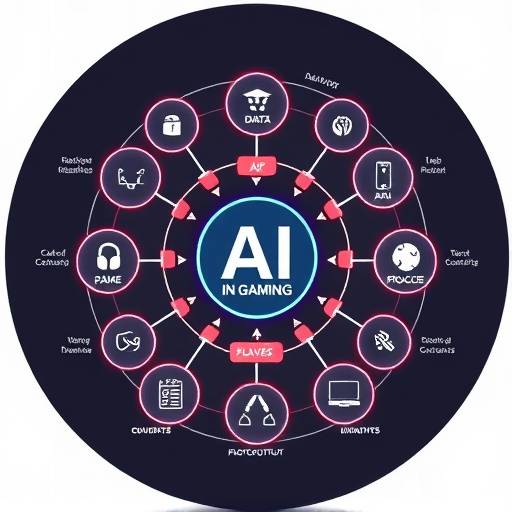The Horizon of Attention: Future Gaming Trends
Peer into the future of interactive entertainment and discover how emerging technologies will reshape the landscape of the gaming attention economy. From AI-driven worlds to immersive metaverses, the next era of gaming promises unprecedented engagement.
Future Monetization Future EngagementThe Evolving Battlefield for Player Focus
The gaming industry, a perpetual innovator, stands on the precipice of transformative change. As technologies mature and player expectations evolve, the very nature of how attention is captured, valued, and utilized within games is poised for a dramatic shift. At NexusPlay Insights, we are meticulously charting these trajectories, offering a glimpse into the future of the gaming attention economy. This isn't merely about predicting the next big game title; it's about understanding the fundamental forces that will shape how players interact with, invest in, and are ultimately captivated by digital worlds.
The finite nature of human attention has always been the bedrock of the attention economy. However, as the digital realm expands and becomes more sophisticated, so too does the competition for this precious resource. The future of gaming is intrinsically linked to its ability to carve out and sustain moments of intense player focus amidst an ever-increasing deluge of digital stimuli. Developers and publishers who fail to adapt to these evolving dynamics risk becoming irrelevant in an industry that thrives on engagement.

Emerging technologies are not just adding new features; they are fundamentally altering the canvas upon which games are built and experienced. Artificial Intelligence (AI) is moving beyond simple NPC behavior to power dynamic, responsive worlds that adapt to individual player actions and preferences in real-time. Virtual Reality (VR) and Augmented Reality (AR) are pushing the boundaries of immersion, creating deeply engaging experiences that can blur the lines between the digital and physical realms. The concept of the metaverse, a persistent, interconnected virtual universe, promises to further entrench gaming as a central hub for social interaction, entertainment, and economic activity.
These advancements bring with them new challenges and opportunities for the attention economy. How do we measure attention in a fully persistent, AI-generated world? What are the ethical implications of hyper-personalized gaming experiences driven by AI? How will the economic models that currently define gaming adapt to the unique properties of the metaverse? These are the critical questions we are exploring.
Artificial Intelligence: The Maestro of Player Engagement
Artificial Intelligence is no longer a futuristic concept in gaming; it is rapidly becoming an indispensable tool for shaping player experiences. In the future, AI will be the unseen architect behind truly dynamic and personalized game worlds. Imagine AI that can:
- Dynamically generate content: Create unique quests, environments, and challenges tailored to a player's skill level, preferences, and past actions, ensuring a perpetually fresh experience.
- Craft hyper-realistic NPCs: Develop non-player characters with complex personalities, motivations, and learning capabilities, leading to more organic and engaging social interactions.
- Optimize player journeys: Analyze player behavior to proactively offer assistance, suggest new pathways, or introduce compelling narrative elements precisely when they are most likely to capture attention.
- Personalize difficulty and pacing: Adjust game challenges in real-time to maintain a perfect balance between frustration and flow, keeping players immersed and motivated.
The implication for the attention economy is profound. AI's ability to create highly tailored and responsive experiences means that player attention can be held more effectively and for longer durations. This also opens up new frontiers for monetization, where personalized content or AI-driven services could become premium offerings.
"The convergence of AI and gaming represents a paradigm shift. We're moving from static, pre-written narratives to living, breathing worlds that learn and adapt with you. This level of personalization is the ultimate frontier in capturing and retaining player attention."
Virtual and Augmented Reality: Immersing Attention
VR and AR technologies are poised to redefine immersion, drawing players deeper into game worlds than ever before. VR offers a complete sensory escape, placing players directly within the game environment, while AR can seamlessly overlay digital elements onto the real world, creating novel gameplay possibilities.
- Unprecedented Presence: VR’s ability to simulate presence makes player attention incredibly potent, as players feel physically present in the game world, fostering deeper emotional investment.
- Interactive Realities: AR blurs the lines between gaming and daily life, allowing for location-based games, scavenger hunts, and interactive storytelling that leverages the player's immediate surroundings.
- New Forms of Interaction: Hand-tracking, eye-tracking, and haptic feedback technologies enhance the sense of touch and agency, making interactions feel more natural and captivating.
- Social Immersion: Future VR/AR experiences will likely focus on highly social and collaborative gameplay, where shared attention within virtual spaces becomes a key element of the experience.
The challenge for VR/AR in the attention economy lies in creating compelling content that justifies the hardware investment and overcomes potential barriers like motion sickness or accessibility issues. However, the potential for deep, uninterrupted player focus in these immersive environments is immense.
The Metaverse: A New Frontier for Persistent Engagement
The metaverse, envisioned as a persistent, interconnected network of virtual worlds, represents perhaps the most ambitious evolution of gaming. It is a space where gaming, social interaction, work, and commerce can coexist and intermingle.

In the metaverse, attention is not just a momentary focus; it is the currency of a persistent digital existence. Players will spend significant amounts of time within these spaces, engaging in a myriad of activities:
- Social Hubs: Gaming will be integrated into broader social platforms where players can meet, interact, and form communities.
- Creator Economies: Players will have greater tools to create and monetize their own content, assets, and experiences within the metaverse, fostering a vibrant, player-driven economy.
- Cross-Platform Interoperability: The ideal metaverse envisions seamless transitions between different virtual worlds and platforms, allowing assets and identities to travel with the player.
- New Monetization Models: Beyond traditional in-game purchases, the metaverse will likely see the rise of digital real estate, virtual goods and services, decentralized finance (DeFi) integrations, and unique advertising opportunities tied to player presence and behavior.
Capturing and retaining attention in the metaverse will require a sophisticated understanding of player motivation, social dynamics, and economic incentives. The ability to provide continuous value, foster meaningful connections, and offer engaging experiences will be paramount. The competition for attention will be fierce, but the rewards for those who can successfully navigate this new landscape will be substantial.
Evolving Player Expectations and Ethical Considerations
As gaming technologies advance, so too do player expectations. Future players will demand experiences that are:
- Highly Personalized: Games that cater to individual tastes and playstyles will be preferred.
- Socially Integrated: Seamless integration with friends and communities will be a key differentiator.
- Meaningful and Rewarding: Players will seek not just entertainment but also a sense of accomplishment, progression, and even tangible value from their gaming time.
- Respectful of their Time: Transparent monetization and engaging gameplay that doesn't feel exploitative will be crucial for long-term trust.
The ethical dimension of the attention economy is also becoming increasingly important. As companies develop more powerful tools to capture and monetize player attention, the responsibility to do so ethically grows. Dr. Elara Vance, a leading researcher in digital ethics, states:
"The future of gaming must be built on a foundation of trust and player empowerment. While the attention economy offers immense opportunities, we must ensure that these opportunities are pursued with integrity, avoiding manipulative designs and prioritizing player well-being. Transparency in data usage and monetization is non-negotiable."
NexusPlay Insights is dedicated to exploring these ethical frameworks, providing guidance on how to build sustainable and player-centric gaming ecosystems in the age of advanced AI, VR/AR, and the metaverse. The future of gaming is bright, and by understanding and thoughtfully engaging with the attention economy, we can ensure it is also responsible and rewarding for everyone involved.